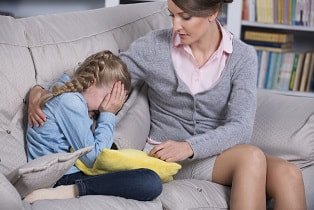 It is important to recognize that anxiety disorders are the most common type of psychological problems found in children and adolescents. Approximately one in ten children meet the criteria for what is technically called an anxiety disorder. Even though anxiety disorders are so common, children are usually referred initially for other reasons. They tend to access treatment when they are displaying aggressive behaviours, attention difficulties, eating disorders or suicidal tendencies. Sometimes the anxiety can go unnoticed due to these other difficulties. It can also be difficult for parents to recognise anxiety as a disorder, due to associating anxiety as part of a child’s personality. Children who experience anxiety can be affected in three different ways:
The amount of anxiety a child experiences will vary from a single fear, such as being scared of going to sleep with the light out, to extremes where a child worries about many aspects of their life. Whether your child is experiencing anxiety relating to a single fear or to an extreme, early intervention is the key through seeking professional help with a Psychologist. Written by: Ms Kerri Corkill, MAPS BSci (Psych), BPsych (Hons) Consulting Psychologist PSY0001722310  Having a child can be the most positive experience in an individual's life. The moment you first see your newborn's face cannot possibly be put into words. The birth of your child is marked by euphoria, mindfulness and an immense sense of responsibility. As the days and months pass by parents quickly realise that unfortunately children and teenagers do not come with a manual. Parenting is not always straight forward or clear and sometimes the rules change. This can make parenting for the first time a daunting and scary experience. There are so many unknowns and questions when raising children: "When should we start toilet training?" "How can I promote my child's self-esteem?" "Should my children sleep in their own bed?" "What are the best ways to handle misbehaviour?" "How much iPad time it too much?" "Why does my teenage child want to spend less time with us now? Are we doing something wrong?" "My child doesn't look me in the eyes, should I be worried?" This is just a brief example of some of the questions racing though most parent's minds. There is an infinite amount of other concerns which parents are faced with day to day. Many parents have the same concerns about their children and it can be difficult to know what a regular part of a child's development is, as opposed to something you should be concerned about. For instance, many children can go through periods of being scared to sleep at night or separating from their parents. To some extent this can be an expected part of child development. However, in other instances where a child is excessively anxious or afraid for extended periods, or following trauma, it can be essential that families seek professional help. True also is the complexity of understanding the teenage years. Parents can be overwhelmed with the dramatic physical and emotional changes in their adolescent child over a relatively short amount of time. Teenagers can become moody, withdrawn and they can isolate themselves from family. In some circumstances this can be an expected part of development. It may be the natural path your child is taking as they transition from a a dependent child to an independent young adult. However, such social and emotional changes in extremes can also be a hallmark feature of mental health decline, such as depression and anxiety. Since there is no parenting manual to assist in raising your child, professional help and guidance can be beneficial to some families. Child and Adolescent Psychologists can provide an objective perspective and professional advice. While Psychologists often work with individuals, in the paediatric and adolescent arena it can be important to involve other family members such as parents and even siblings. Of course, this would depend on the individual circumstances of the client and it would need to be clinically appropriate as well as with consent. For instance, children with emotional regulation difficulties and anger outburst can benefit greatly from individual psychological support from qualified clinicians. However, the younger the child the more likely that a parent will be involved more actively in the sessions with a Psychologist. This allows parents to learn the strategies taught to the child also and assist their children to implement them day to day. Parent involvement also allows for Mum and Dad to draw on the extensive knowledge of Child Psychologists to broaden their own knowledge. Parent involvement in adolescent sessions would depend on the teenager providing consent. In many instances clinicians can encourage teenage clients to involve their parents or consent to Psychologists providing feedback to Mum and Dad. In several ways this can promote positive outcomes for the individual, as it allows parents to gain a greater understanding of their child's needs and perspective. It can also further develop communication skills and independence. It is also important to note that, while children do not come with a manual, parents can use Child and Adolescent Psychologists as an interactive manual for childhood development. They can request individual sessions with clinicians for psychological consultation and advice about parenting even if their child is not seeing a professional. This can be helpful for mothers and fathers as it can guide them in best practice with parenting or how to respond to emotional and social changes. It can also be helpful for parents to seek advice with assisting their children during life changes such as how to best parent after separation. There are many ways Child Psychologists can help families. Clinicians can work with individuals or groups. The can assist one family member or many. They can give parenting and developmental advice to put things in perspective. While there is no parenting manual we can guide you on your parenting journey. Contact us today on 02 4929 2223 or email us for further information.  The most important thing parents can teach teens when learning how to drive is how they can stay safe on the road. As featured in an article ‘Driving Lessons and Road Safety Tips for Teen Driving’ for NSW Compensation Lawyers on driving safety tips for teens, our expert psychologists at Oracle Psychology know how to work with teens, to help ensure safe practices develop. As Principal Psychologist and Director of Oracle Psychology, Mr Daniel Wendt, along with our team of qualified child and adolescent psychologists, offers expertise to assist with children and young people. We work closely with families in the Newcastle, Hunter and Central Coast regions of New South Wales to ensure wellbeing and successful outcomes. Mr Wendt advises that teaching teens how to drive can be a daunting experience, not just for teens but for parents as well. However, this step towards independence marks a rite of passage, whereby parents should encourage and share in their child’s excitement while promoting road safety. Leading by example is at the top of these safety tips, as education by experience is a strong method for learning new skills and responsibilities. When you demonstrate road safety every day, you show your child the importance of being calm, in control and alert while driving. It’s suggested that you take the time to praise successes throughout the learning process, with emphasis on your teen's ability to accept responsibility. You can enhance this by pointing out things that you look for when driving and encouraging discussions around this. Young drivers should imagine they’re in someone else’s shoes when driving and picture everyone on the road as a loved one. No one wants their mother, father, brother or sister to be in danger on the roads, therefore driving in this way increases an overall sense of responsibility and alertness. Finally, one of the most important tips is to always plan ahead, especially as teens generally reach drinking age at the same time as receiving a license. Though it’s perfectly normal to have fun with friends, it’s vital to ensure teens are prepared to leave the car at home, if the activity involves drinking. When you lead by example and offer positive encouragement, your teen will start their driving career fully equipped with the knowledge necessary to stay safe on the roads.  Many parents find bedtime one of the most difficult parts of the day. Children often want to stay up “just a little longer” and this tugs at the heartstrings of their mums and dads. Even more complicated are times when children express anxiety at night and seem scared to go to sleep alone. It can be easy to fall into a habit of laying with your child until they fall asleep or to allow them to sleep in your bed. While short-term this may seem like a quick fix, in the longer-term it can affect spousal relationships, family routines and the child’s confidence. It can also implicitly send the message that they are not safe without you with them. While children may go through short developmental phases of being scared to sleep alone at night, when these difficulties persist or become excessively frequent and distressing it may be time to intervene. The age of the child also comes into play when considering how much of a concern the anxiety has become. Ultimately, it is important for children to feel comfortable sleeping in their bed by themselves. After all, their own bed in their own home is really the safest place in the world. If a child doesn’t feel safe in their own bed it can be difficult for them to feel confident elsewhere. If you have decided to help your child overcome their night-time fears, one of the most important things to assist them to sleep soundly alone in their own bed is to send the message that it is safe. It is really important that you encourage your child to confront their fears with some initial gentle reassurance. Try not to be overly reassuring as this can come across as anxiety provoking. That is, it may seem to your child that you are trying too hard to encourage them, so it must be really difficult to do. Be mindful of your body language, tone of voice and the words you use. Project calm and remain poised when you communicate with your ‘little one’ and they will share in your confidence. Using a reward system can be helpful to encourage them to challenge themselves. For example, a jar with shiny stones (purchased from a discount store) which you give your child for being brave. They can start earning them for staying in their bed all night by themselves or by doing other things they are not confident with. Remember, the bad thing about anxiety is that it can spread. However, the wonderful thing about confidence is that it will certainly spread. Reassure your child initially by explaining “Mum and Dad would never ask you to do something that’s dangerous. We know our house is safe and so is your room. It’s important that you show yourself how brave you can be by sleeping in your bed all night. When you do this you’ll get a ‘brave stone’ to put in the jar. Once the jar is full you will get a special reward”. Try and find something that will really motivate your child to overcome the fear based on their interests (e.g. going to the movies, trampoline park, laser tag, etc.). When night-time comes it is important to continue to project calm and confidence. This can be extremely difficult if your child is distressed. However, remember that they will draw on your approach to the situation and in time will adopt the same level of composure, by learning from watching you regulate your own emotions. Try and establish a soothing and consistent bedtime routine (e.g. have a bath, read a story in bed and then sleep time) and give them directions with certainty. For example, “It’s sleep time now. I love you and I’ll see you in the morning” then leave the room peacefully as if all is going to plan. It’s up to you if you let your child come in to your room if they wake up in the middle of the night or keep coming out of their room. This is okay, however, it is extremely important that they then be calmly redirected back to their bed and that you are persistent with this. At that point ask your child “What did Mum and Dad say about overcoming you fears?”. It’s important that you assist your child to come up with the answers through prompting rather than giving them the responses. You need them to internalise their own self-talk that “Mum and Dad know my room is safe and there’s nothing to be afraid of. The noises outside are just normal night noises like birds, cats and cars going by”. As difficult as it may be (and as much sleep as you may lose) you need to make sure that your child sleeps back in their own bed after they wake up. This may cost you sleep to begin with but it will save you a lot in the long run. These strategies will be helpful in assisting you to address your child’s night-time anxiety. However, some children and families may require professional support due to more extreme or persistent difficulties. If you would like to seek advice or support in regards to your child’s anxiety please contact us today on 02 4929 2223. Our experienced and qualified Newcastle based Child Psychologists can assist. #childpsychology #childhoodanxiety #parenting #Newcastle Newcastle Child Psychologist Daniel Wendt discusses parenting, emotion coaching and children. Newcastle Child Psychologist Daniel Wendt discusses childhood tantrums. |
AuthorChild Psychologist Daniel Wendt is the Principal Clinical Psychologist of Oracle Psychology in Newcastle, NSW. Archives
August 2023
Categories
All
|
- Home
- New Clients
-
Psychological Services
-
Our Child Psychologists
- Candice Byrnes, Child Psychologist
- Claire Mortimer, Senior Clinical Psychologist
- Dan McAlpine, Senior Psychologist
- Daniel Wendt, Principal Clinical Psychologist
- Eliza Skelton, Clinical Psychologist
- Julia Macris, Child Psychologist
- Kane Becker, Child Psychologist
- Kate Purcell, Child Psychologist
- Kerri Corkill, Clinical Psychologist
- Liam O'Dell , Child Psychologist
- Lucy Rosser, Child Psychologist
- Madeline Cordingley, Clinical Psychologist
- Madeline Guinane, Child Psychologist
- Madeleine Patience , Child Psychologist
- Merel Van Emmerik, Child Psychologist
- Travis Boehm, Child Psychologist
- Zoe Guider, Clinical Psychologist
- Frances Fay, Behaviour Support Pracitioner
- Lauren Saunders, Behaviour Support Pracitioner
- Fees & Rebates
- Contact Us
- Psychologist Articles
- Multidisciplinary Referrals
|
Oracle Psychology Pty Ltd
19 Bolton Street, Suite 6, Level 1, Newcastle, NSW, 2300 P: 02 4929 2223 F: 02 4929 3637 E: [email protected] ABN: 4716 427 5709 ACN: 164 275 709 |
 RSS Feed
RSS Feed





